What Links Here?
Outbound Links
- ⭐ john-bambrick-b1791
- ⭐ harriet-bambrick-b1895
- VictoriaCross.org.uk - Valentine Bambrick
- VictoriaCross.org.uk - Valentine Bambrick
- The Indian Mutiny
- 🖼️ val_bambrick_4612830288.jpg
- 🖼️ val_bambrick_medal_replicas_4618996977_436x331.jpg
- 🖼️ val_bambrick_cemetary_plan_4619127148_586x473.jpg
- source of 3 pictures and captions above
- 🖼️ burial_register_valentine_bambrick.jpg
- Famous Names in St Pancras and Islington Cemetery
- 🖼️ valentine_bambrick_extract.png
- "The Victoria Crosses that Saved an Empire: The Story of the VCs of the Indian Mutiny"
- Wikiwand: Valentine Bambrick
Valentine Bambrick (b1837)
Son of John Bambrick (b1791) and Harriet Bambrick (b1895).
The following extract is from: VictoriaCross.org.uk - Valentine Bambrick
And copyright resides with Iain Stewart, 19 January 2003:
THE UNVEILING OF A MEMORIAL PLAQUE TOOK PLACE TO THE MEMORY OF RIFLEMAN VALENTINE BAMBRICK VC, 60TH RIFLES, AT ST PANCRAS AND ISLINGTON CEMETERY, WHERE HE LIES IN AN UNMARKED GRAVE
Islington, North London, 10th September 2002
A plaque in memory of Rifleman Valentine Bambrick VC was unveiled on Tuesday, 10th September 2002, in St Pancras and Islington Cemetery where Bambrick lies in an unmarked grave, of which the exact location cannot be pinpointed. The memorial plaque was unveiled by Lieutenant-General Sir Christopher Wallace, chairman of the 60th Rifles Officers' Club, attended by the Mayor of Islington, Councillor Margot Dunn, members of the Finchley Society and The King's Royal Rifle Corps Old Comrades Association.
[ London Gazette, 24 December 1858 ]. Bareilly, Indian Mutiny, 6 May 1858, Private Valentine Bambrick, 1st Bn, 60th Rifles.
For conspicuous bravery at Bareilly, on the 6th May 1858, when in a Serai, he was attacked by three Ghazees, one of whom he cut down. He was wounded twice on this occasion.
Bareilly lies 140 miles east of Delhi and in the Sepoy Mutiny of 1857 the native troops stationed there rose on May 31 and left to join the rebels in Delhi in June 1857. The rebels returned to Bareilly in September after Delhi had been relieved by British Forces and were joined by several insurgent leaders with their supporters.
The British Army were despatched to Bareilly under General Sir Colin Campbell which included the Roorkee Field Force, incorporating, among other units, 1st Battalion the 60th Rifles, with whom marched Private Valentine Bambrick. General Campbell arrived at Bareilly on 6th May 1858, with the Roorkee Field Force under the command of Brigadier-General John Jones who had commanded the 1st / 60th Rifles during the siege of Delhi. The whole of the 1st Battalion took part in the assault on Bareilly.
Confused fighting followed the entry of British troops into the warren of streets and alleyways. A party posted on a roof-top by Lieutenant Cromer Ashburnham, commanding D Company, gave warning of a large body of "Ghazees" towards the serai or group of buildings within which Bambrick fought his personal engagement with three of them. ( It might be considered that Bambrick's action was simply one of self-defence, but it was not unusual for the VC to be awarded to an individual who in the eyes of his comrades had most distinguished himself in a decisive action in which they had all taken part ).
Valentine Bambrick was born in Cawnpore on 13 April 1837 and came of fine military stock, his father, uncle and younger brother all serving with the 11th Light Dragoons. Bambrick's own military record shows he was an "unruly soldier" but as every commanding officer knows, soldiers who are unruly in the guardroom tend to come up trumps in action. After the action at Bareilly, Bambrick continued to serve with the 1st / 60th Rifles at Seetapore, but when the battalion left for England in August 1860 he elected to stay in India and transferred to the 87th Foot, later the Royal Irish Fusiliers. He served with the 87th at the Curragh, Ireland, and was discharged at Aldershot on 16th November 1863, when his luck changed.
Shortly after his discharge from the army Valentine Bambrick was involved in an incident where as he was proceeding to a room with a woman, he was approached by another female who asked him for protection from a beating by one Henry Russell. A fight ensued and later Russell accused Bambrick, and the woman he was with, Charlotte Johnson, of violent assault and of stealing his medals.
A report from The Hampshire Chronicle, dated 5th December 1863, on the trial of Valentine Bambrick VC.
ASSAULT. Valentine Bambrick and Charlotte Johnson, spinster, were charged with violently assaulting Henry Milner Russell, and stealing from his person four medals, value 30s, his property, at Aldershot on the 15th November 1863. Mr. Cole prosecuted.
It appeared that the prosecutor ( Russell ) was invited by Bambrick on the evening in question, whilst passing through the street, to take some ale in a private house at Aldershot, the male prisoner standing with a pot of ale in his hand. Prosecutor offered to stand some drink in return, and he put his hand into his pocket to get the money, when the male prisoner seized him and threw him down, the female assisting in holding the prosecutor, who was a lance-corporal, down. During the affray the soldier lost the four medals from his breast, which the prisoners had torn off, and made their escape with. On the landing two of the medals were picked up by the landlord, and the prisoners were both apprehended the same evening.
Bambrick, in defence, said he was going up to the room of the female prisoner, when he saw another female leaving her room, and she appealed to him for protection. A fight ensued, in which the prosecutor lost his medals. He ( Bambrick ) urged that if his better feelings would not have prevented him committing such a paltry robbery, his interest would, for he was in possession of a medal more prized by the British soldier than all those possessed by the prosecutor - the Victoria medal, which conferred £10 annually upon him, and also a pension, all of which he would lose if convicted. He urged that it would have been much easier for him to have dashed the beer he had in his hand in the prosecutor's face whilst in the street if he wanted to rob him of his medals, and averred that the prosecutor had generally stated in his evidence that which was false.
The proof of the prisoner's guilt, however, was considered to be conclusive by the jury, who immediately found them both guilty of the charge. On hearing the verdict Bambrick immediately change his tone, spoke most contemptuously of the Court, and said he did not care what his sentence should be, and threatened that he would be revenged on Henry Russell. His lordship said it was most sad to see a soldier in the position of the prisoner - one holding so high a mark of honour conferred upon him by his country, and that he should take time to consider his verdict. The prisoners were subsequently sentenced - Bambrick to three years penal servitude, and Charlotte Johnson to twelve months imprisonment.
Bambrick had placed the woman he'd saved from a beating in a hotel to present her as his only defence witness at his trial. However, owing to the length of time to bring the case to court, he lost touch with her. As a result of his conviction, Valentine Bambrick had his Victoria Cross forfeited by Royal Warrant on 3rd December 1863. Bambrick fell into a state of deep depression, and after writing a letter protesting his innocence of theft, while the fight with the other man was in defence of a woman whom the latter was murdering, he hanged himself in Pentonville Model Prison on 1st April 1864. Although Bambrick did not seem to be aware of it, the Governor of the Prison had expected Bambrick to be released on the strength of his recommendation for a commutation of sentence. Both he and the Governor of Winchester Gaol considered Bambrick to be innocent. The influence of King George V came into play over the forfeiture of the Victoria Cross from eight men who had been convicted of theft, bigamy and desertion. In 1920 the King wrote a letter to his private secretary, Lord Stamfordham, in which he wrote "The King feels so strongly that, no matter the crime committed by anyone on whom the VC has been conferred, the decoration should not be forfeited. Even were a VC to be sentenced to be hanged for murder, he should be allowed to wear the VC on the scaffold". The names of all eight men, including Valentine Bambrick, were eventually added to the Register of Victoria Cross recipients.
Following King George V's decision to reinstate the Victoria Cross to those eight men who had had their medal forfeited, it is unclear if the War Office ever presented the VC awarded to Valentine Bambrick to one of his relatives. The Bambrick VC has never been sold or put up for auction and its whereabouts is unknown to this day.
Medal entitlement of Rifleman Valentine Bambrick - 1st Bn, 60th Rifles
- Victoria Cross
- Indian Mutiny Medal - (
1857-58)
(End of extract from VictoriaCross.org.uk - Valentine Bambrick © Iain Stewart, 19 January 2003.)
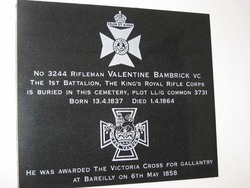
Bambrick's grave in St Pancras Cemetery is unmarked, so a plaque was mounted in the Chapel of the Cemetery in 2002.
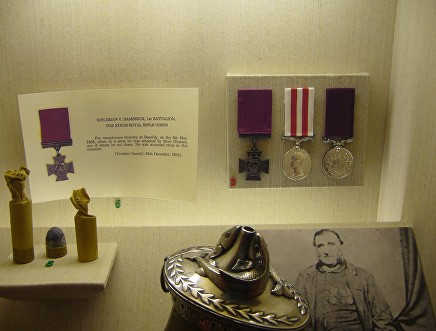
Bambrick's medals are not publicly held. In 2012, replicas of his medals were displayed at the Royal Green Jackets Museum, Winchester. (Picture - Thomas Stewart).
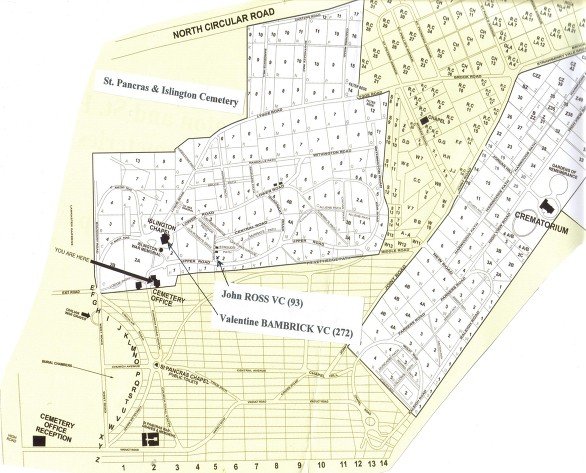
Cemetery Plan courtesy of Kevin Brazier PLOT LL/G, GRAVE 3731 (UNMARKED)
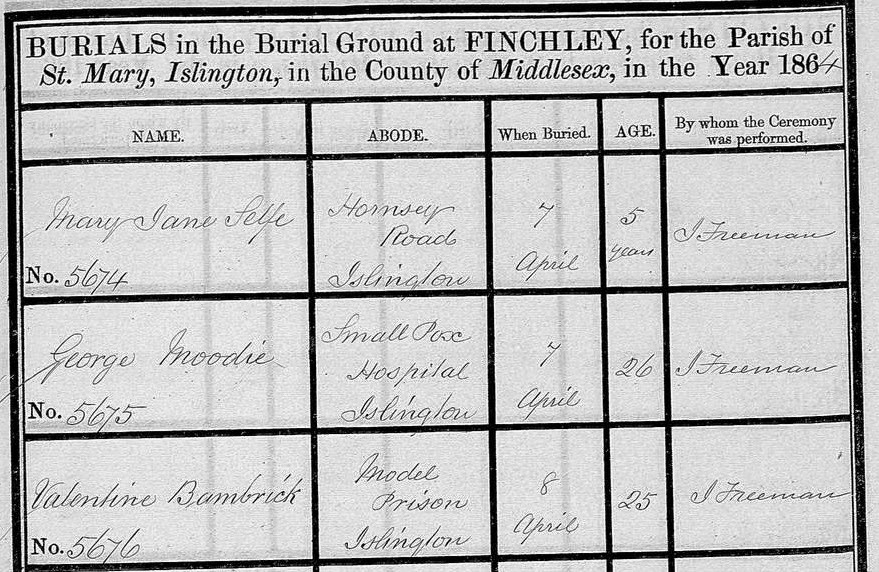
- source of above:Famous Names in St Pancras and Islington Cemetery includes this quote:
Sadly there is no headstone of the grave of another military hero, Victoria Cross awardee, Valentine Bambrick (1837-1864). Bambrick received the VC after being attacked at Bareilly in 1858 during the Indian Mutiny. Three years later, in London, Bambrick was convicted of assault and theft of a comrade's medals. He was thus stripped of his own medal and sent to Pentonville Prison, Whilst there, the stricken Bambrick killed himself. He was then buried in a pauper's grave. Perhaps one of the only mementoes of his death is this record found on the Deceased Online database of 25 year old Bambrick's burial in the cemetery at Finchley on 8 April 1864. A memorial plaque was belatedly erected to him in St Pancras and Islington Cemetery in 2002.
References
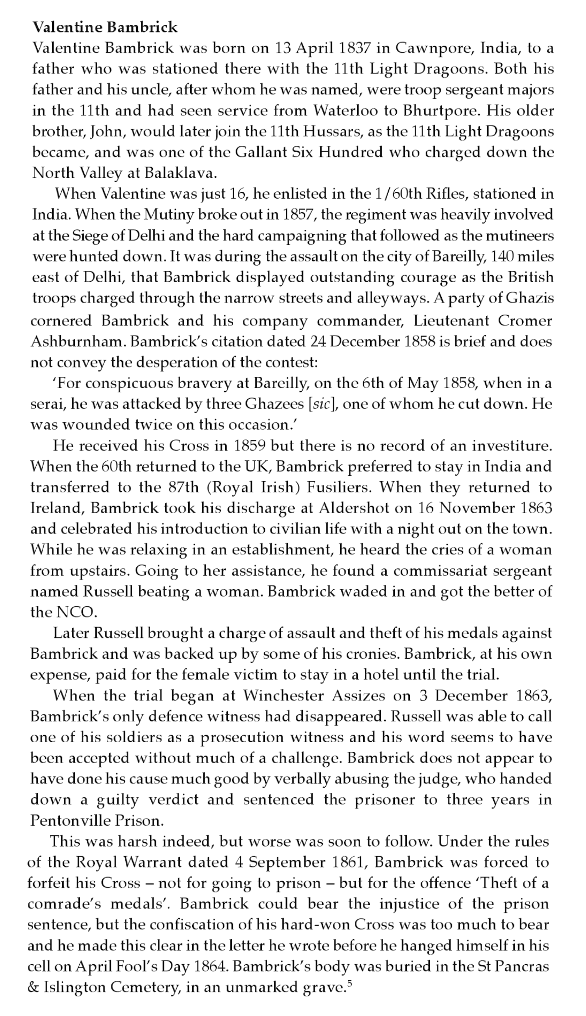
- Extract from "The Victoria Crosses that Saved an Empire: The Story of the VCs of the Indian Mutiny"
- Wikiwand: Valentine Bambrick
1864
http://trove.nla.gov.au/newspaper/article/60560433
Empire (Sydney, NSW : 1850 - 1875) Fri 29 Jul 1864 Page 3 MELANCHOLY SUICIDE IN PENTONVILLE PRISON
MELANCHOLY SUICIDE IN PENTONVILLE
PRISON
An inquiry of a melancholy character was instituted by Dr.
Lankester on Tuesday evening at the Pentonville Model
Prison, relative to the death of a prisoner, Valentine
Bambrick aged twenty-eight years, who was found dead
and hanging in his cell on Friday evening last. Last week
a similar inquest was held.
Mr Charles Lawrence Bradley, medical officer of the
prison, said he had been told that he (prisoner) fretted, as
he was being unjustly punished for a crime of which be was
not guilty. His mind was no doubt impaired, and he had
suffered from delirium tremens. A letter was written on
slate by deceased which might be worth the attention of
the jury
On the production of the slate the droner read the fol-
lowing letter : -
" My dear, dear Friends and Family, - Becoming quite
tired of my truly miserable existence, I am about to rush
into the presence of my Maker uncalled unasked. To you I
appeal for forgiveness and pardon for all the unhappiness I
have ever caused you. I dare not ask for mercy of God. I
am doing that which admits of no pardon, but if He will
hear my prayer. I pray to Him to grant you consolation in
your hour of affliction, for I know that, notwithstanding all
my faults, that love which you always manifested towards
me is not withheld yet, and therefore the news of my un
fortunate fate will make time sorrowful. Pray for your
unfortunate son
"VAL BAMBRICK.''
"P.S.-Before I die I protest solemnly my entire
innocence of the charge for which I was punished, all but
the assault, and that was done under the circumstances
before mentioned to you in my letter.
" God bless you all Love to all my relations. Pity even
while you condemn '
" POOR VAL "
John Potter a prisoner, said he was in the next cell to the
deceased. He did not know until that afternoon that he
was dead, when the deputy-governor sent for him and told
him. He only knew deceased by his number, G 21.
Deceased had spoken to him twice. The first time he said,
''I have sent out a special letter, and I expect to be
discharged." The second time he said he was an innocent
man.
The Coroner-Have you any complaint to make of the
diet you have given to you?
Prisonor - No, sir ; I have meat every day
A juror-When the deputy-governor called yon down,
did he instruct you as to what you were to say here?
Prisoner--No, sir.
The foreman, referring to the statement made by the
prisoner they had just examined, wished to know whether
that special letter had been forwarded to the friends.
Captain Craig (the governor, who had been sent for)
informed the jury that on the 26th of February the prisoner
applied to him for permission to write a special letter, and
as he was a well-behaved man he granted the application
Prisoners were only allowed to write a letter on their entry,
and then one every three months. The deceased was not
entitled to write until this month. That special letter was
forwarded to his family directly. A petition followed, and
there was no doubt that, if a certain woman had been found
the deceased would have obtained his release. The deceased
came from Winchester Gaol ; the governor there, feeling
highly interested in the prisoner, endeavoured to get a
commutation of sentence. He considered he was perfectly
innocent, as did also he (Captain Craig). The deceased
was charged with stealing a Victoria Cross and several
medals from a soldier who had created a disturbance in a
brothel at Aldershot with a prostitute. The woman
screamed " Murder," and the deceased (who was also a
soldier) went to protect her. He thrashed the other soldier,
during which his medals fell off Deceased picked them up
and put them on the mantle-shelf. They were, however,
lost and the deceased was accused of the robbery.
Deceased also had a Victoria Cross and medals and
a pension of £10 a-year for life; the latter, was however,
forfeited by the conviction While the deceased was in
that prison an order from the Secretary of State arrived,
directing that the Victoria Cross which had been obtained
by the deceased should be also forfeited, and this also affected
the deceased.
A juror wished to know if a copy of the letter on the date
would he forwarded to the friends
Captain Craig replied that no transcript would be made,
but the original became their property, and would be
forwarded to them with the decision of the coroner's
jury. The body could be buried either by them or otherwise.
After some remarks on the very melancholy character of
the case,
The jury returned a verdict of " Suicide while labouring
under unsound mind."
1863
http://trove.nla.gov.au/newspaper/article/3169054
The Courier (Brisbane, Qld. : 1861 - 1864) Sat 12 Mar 1864 Page 3 FLOGGING IN THE ARMY.
FLOGGING IN THE ARMY.
From the Daily Telegraph, December 8.
(Note this was published in the Courier on 12 Mar 1864, but is from the Daily Telegraph December 8, presumably 1863!!)
On Thursday last a soldier was tried at
Winchester Assizes whose case may serve to
illustrate the kind of men with whom the
army authorities have to deal, and to remind
the public, at the same time, how much
rough and rude nobility is still to be
found in the ranks. Valentine Bambrick,
a man who had earned the Victoria Cross
by his valor, has just been sentenced to
penal servitude for three years. The
story is short and simple. Drinking one
night at Aldershot, a brawl arose, in which
some of the miserable women who haunt the
purlieus of the camp were concerned. Caro-
lina Johnson—who is described, with a world
of pathetic significance in the formal phrase-
ology, as "spinster, without occupation"—
was in the company of Bambrick. Russell,
a lance corporal in the Commissariat Depart-
ment, came up to the door of the house, in
front of which they were standing, and in
which Russell also was a lodger. If the
story of the latter is to be entirely trusted—
and it was undoubtedly believed both by
judge and jury—Bambrick suddenly rushed
upon him without the slightest provocation,
assaulted him, and tore from his breast four
silver medals. For stealing those he was
placed upon his trial, and his statement that
he attacked Russel simply because the latter
was ill-treating a woman was unsup-
ported by any other testimony than his
own. He had served in the army for
ten years; he would have been entitled
to his discharge the very day after this occur-
rence. When the verdict of guilty was de-
livered, the judge, who had been struck by
the soldier's manly bearing and evident in-
telligence, deferred passing sentence until
the following morning; but as they moved
the prisoner from the dock he cried out, " It's
of no consequence what you do now. I don't
care about loosing my pension; but I have
lost my position. I don't care what you do
with mo. You may hang me if you like."
Next day the judge condemned him to penal
servitude for three years ; and thou, turning
to tho female prisoner, he was about to pass
sentence upon her, when Bambrick, seizing
the girl's hand in his strong grasp, held it
aloft, and cried out, with a wild chivalry
that must have appealed to the human sym-
pathy of every one in that court, "Look
at this small hand, my lord! What
could she have done against a strong man?
She was merely in the room." His last words
before he was led away to gaol wore these,
"There won't be a bigger robber in England
than I shall be when I come out I" It was a
reckless and desperate speech; but such a
man as this is not to be despaired of. For
once, the prison chaplain will, we venture to
assert, meet with a nature that can be won
to better things. This soldier—one of our
proudest "Legion of Honor"—never did any-
thing finer or braver then when, faithful to
the last to his unhappy companion, he made
that touching appeal on her behalf.
The roughest fellows in the ranks have in
them some elements of good. Humanity,
kindness, consideration for their failings,
would soon develop these to their full extent.
Such men as Bambrick are not uncommon ;
but their virtues are stunted, their vices con-
firmed, by a system which gives them
scarcely any opportunities for self-improve-
ment, whilst it punishes their faults and
error by the lash. The cat-o-nine-tails
never yet made a bad soldier into a good one;
but it has made many a good one bad.